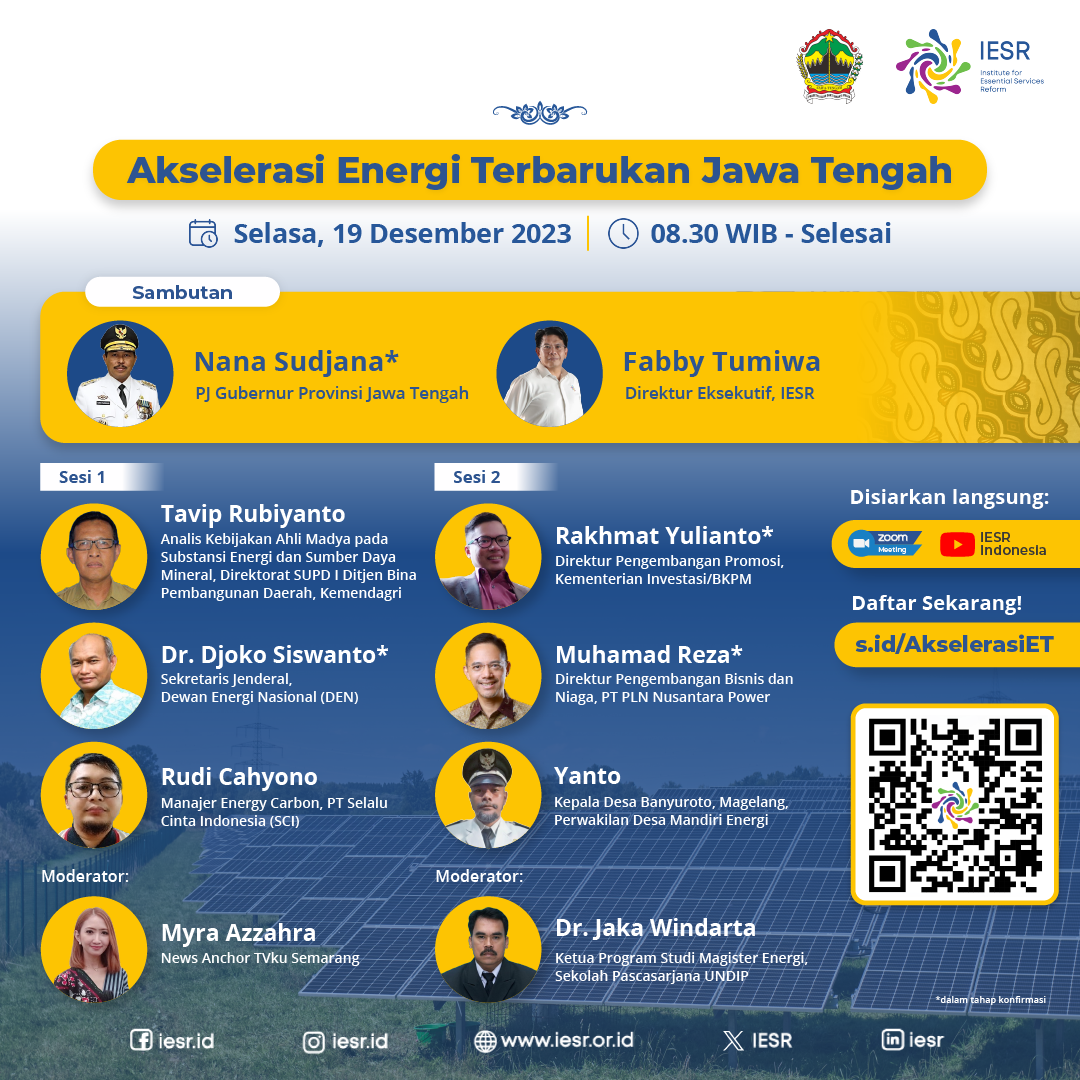
Accelerating Renewable Energy in Central Java
Tayangan Tunda
Background
Indonesia has affirmed its commitment and support for climate change mitigation efforts in the Nationally Determined Contribution (NDC) document to reduce emission targets from 29 percent to 31.89 percent with its own efforts and from 41 percent to 43.20 percent with international assistance by 2030. Indonesia has made various efforts and multi-stakeholder collaborations to achieve these targets. In addition, the Government of Indonesia is increasing access to finance and technology solutions to attract and unlock investment projects, especially in the energy, industry, transportation, and environment sectors.
In line with this, at the regional level, Central Java Province has targeted a renewable energy mix of 21.32 percent by 2025, slightly below the national target of 23 percent. In achieving this target, the Central Java Provincial Government has developed strategies through regulations and policies, identification of potential, development through the APBD and APBN, and inviting multi-stakeholder participation in developing renewable energy in Central Java. However, until 2022, Central Java’s energy mix target had only reached 15.76 percent. Central Java still needs to develop more renewable energy potential and open investment projects in the energy, industry, transportation, and environment sectors to achieve low-carbon regional development.
Based on data from the Greenhouse Gas Inventory Report (KLHK, 2021), the largest contributor to emissions came from the energy sector, which amounted to 46.32 percent, followed by the waste sector at 35.05 percent. Within the energy sector, industry and transportation contributed 65.45 percent and 20.61 percent of GHG emissions, respectively. This figure is quite high. Seeing this condition, as a regional partner since 2019, the Institute for Essential Services Reform (IESR), together with the Central Java Provincial Government and more stakeholders in Central Java, continues to strive, commit, and collaborate in the energy, industry, transportation, environment, and investment sectors as a form of contribution to the integration of energy transition issues and low-carbon regional development in Central Java.
Currently, IESR is involved in the preparation of the Regional Long-Term Development Plan (RPJPD) and the revision of the Regional General Energy Plan (RUED) of Central Java Province. This aims to help provide policy recommendations and obtain the best scenario for achieving low-carbon regional development in Central Java. In addition, IESR, together with the Central Java Provincial Government, continues to provide public dissemination, training, and capacity building related to renewable energy and energy transition to the government at the provincial, district/city, village, company, vocational school students, and the general public.
IESR recognizes that energy transition is a complex process with huge implications that require multi-stakeholder involvement in order to anticipate and mitigate the impact of energy transition in the region in particular and in Indonesia in general. Considering the urgency and complexity of multi-stakeholder involvement ranging from policymakers at the provincial, district, city, village, and community levels, which have an important role in the smooth energy transition, Therefore, IESR plans to organize an activity forum and conduct public dialogue and dissemination with relevant stakeholders with the title “Central Java Renewable Energy Acceleration.” This activity is held in order to provide socialization and more in-depth information about the renewable energy transition and strengthen commitment, roles, and responsibilities together to encourage multi-stakeholder participation in the energy transition in Central Java.
Activity Objectives
- Provide the latest information on policies related to the development of renewable energy policies and the development of renewable energy utilization at the national, provincial, and district/city levels.
- Provide general information on the role of provincial, district, and city governments and communities in the utilization of renewable energy and renewable energy conservation in Central Java.
- Provide more in-depth information to policymakers in the provincial and regency/city governments in Central Java related to policies, budget procurement procedures, renewable energy investment, and lessons learned on multi-sector renewable energy implementation.
Presentation
Key Speech of the Governor of Central Java
Pidato-Kunci-Gubernur-Jawa-TengahAuthority, Budgeting and Strategy of Provincial and Regency / City Renewable Energy Sub-Sectors – Tavip Rubiyanto
Kewenangan-Penganggaran-Dan-Strategi-Sub-Bidang-Energi-Terbarukan-Daerah-Provinsi-Dan-KabupatenKota-Tavip-RubiyantoProgress Update on Draft Government Regulation on National Energy Policy – Djoko Siswanto
Perkembangan-Pembaruan-Rancangan-Peraturan-Pemerintah-Tentang-Kebijakan-Energi-Nasional-Djoko-SiswantoEmpowering Growth: Harnessing Renewable Energy for Sustainable Production and Business Advantages – Rudi Cahyono
Empowering-Growth-Harnessing-Renewable-Energy-for-Sustainable-Production-and-Business-Advantages-Rudi-CahyonoGreen Investment Opportunities and Development in Central Java – Ir. Sakina Rosellasari
Peluang-dan-Perkembangan-Investasi-Hijau-di-Jawa-Tengah-Ir.-SAKINA-ROSELLASARIDevelopment of Public-Private Green Investment Opportunities in Provinces and Districts/Cities – Rakhmat Yulianto
Pengembangan-Peluang-Investasi-Hijau-Publik-Swasta-di-Daerah-Provinsi-dan-Kab-Kota-Rakhmat-YuliantoPLTS Terapung Cirata Lesson Learned – Adimas Pradityo Sukarso
PLTS-Terapung-Cirata-Lesson-Learned-Adimas-Pradityo-SukarsoBiogas Banyuroto Village – Yanto Kepala Desa Banyuroto MGL
Biogas-Desa-Banyuroto-Yanto-Kepala-Desa-Banyuroto-MGLSpeaker
-
Fabby Tumiwa - Chief Executive Officer (CEO) - IESR

